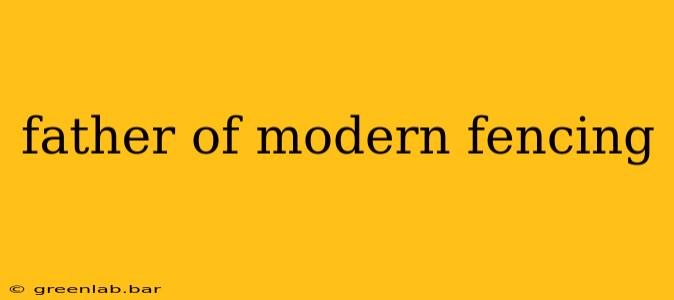The title "Father of Modern Fencing" isn't officially bestowed like an Olympic medal, but if it were, Armand Massé would undoubtedly be the frontrunner. While fencing's history stretches back centuries, Massé's contributions in the late 19th and early 20th centuries fundamentally reshaped the sport, laying the groundwork for the fencing we know and admire today. His impact wasn't merely about codifying rules; it was about systematically analyzing and improving technique, pedagogy, and the very philosophy of the sport.
Massé's Revolutionary Approach to Fencing
Massé wasn't just a skilled fencer; he was a brilliant instructor and innovator. He approached fencing not as a mere contest of skill, but as a science. This scientific approach, meticulously documented in his influential treatises, revolutionized how the sport was taught and practiced.
Beyond Brute Force: Technique and Precision
Before Massé, fencing instruction often focused on strength and aggressive attacks. Massé, however, emphasized precision, timing, and footwork. He dissected the techniques, breaking them down into fundamental components that could be systematically learned and refined. This analytical method allowed for a deeper understanding of strategy and tactical application, moving beyond the limitations of purely physical dominance.
The Birth of Modern Fencing Footwork
Massé's contributions extend significantly to the crucial aspect of footwork. He developed and refined footwork techniques that are still considered fundamental to modern fencing. His emphasis on agility, balance, and efficient movement significantly enhanced both offensive and defensive capabilities. This emphasis on footwork is particularly visible in the rapid, intricate movements characteristic of modern foil fencing.
Pedagogical Innovations: Teaching the Art of Fencing
Massé’s influence wasn't limited to his own mastery; he was a highly effective teacher. He developed a system of instruction that made fencing more accessible and easier to learn, particularly for beginners. His pedagogical methods, emphasizing progressive learning and repetitive drills, remain a cornerstone of fencing instruction today. His books and manuals became indispensable for aspiring fencers, shaping generations of practitioners.
Massé's Lasting Legacy: A Modern Sport Emerges
Massé’s work wasn't just about refining existing techniques; he actively contributed to the formalization of the sport. His influence is evident in the modern rules and regulations of fencing, particularly in the areas of scoring and refereeing. He played a crucial role in establishing standards that allowed for fair competition and helped standardize the sport for international recognition. He helped to transition fencing from a more haphazard, regionally diverse activity into a regulated, globally competitive sport.
Key Contributions Summarized:
- Systematic approach to technique: Breaking down complex movements into fundamental components.
- Emphasis on precision and footwork: Elevating agility and tactical awareness.
- Development of effective pedagogical methods: Making fencing more accessible to a wider audience.
- Standardization of rules and regulations: Contributing to the formalization of the sport at a global level.
In conclusion, while the title "Father of Modern Fencing" might be informal, Armand Massé's profound and lasting impact on the sport is undeniable. His analytical approach, pedagogical innovations, and commitment to refining both technique and the rules have shaped fencing into the sophisticated and globally popular sport it is today. His legacy continues to inspire fencers and instructors across the world.

